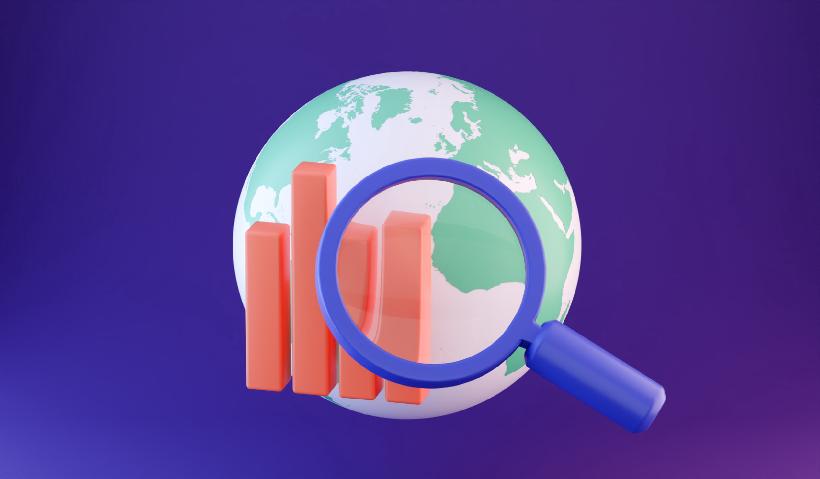The world is a unique place with lots of different cultures and nations intertwined and interconnected. A great way to understand one another better is to speak their language. Knowing more than one language is always an advantage wherever you are in life. Going abroad? You can communicate with the locals. Job opportunity? Stand out amongst other candidates. Want to stay sharp and improve your cognitive abilities? Choose a language to learn. Possibilities are limitless, just like the choice when it comes to languages (well, to be exact, there are 7,100 languages in the world, but to my knowledge no one has ever learnt all of them).
But what languages are the most popular when it comes to studying them? Whether you are looking for inspiration or just generally curious, here’s a top 10 list of languages that are the most studied in the world. As a bonus, I’ll throw in a few reasons to get you inspired to start your language learning journey.
Why You Should Learn a Language
The reasons to pick up a new language to study in your spare time can be very different. Maybe you liked the sound of it in a song. Maybe you want to move to a new country. Or maybe it’s your new hobby. Whatever the reason is, you can always be sure that it will never be in vain. But if you need some inspiration, here you go:
1. Career Opportunities
An extra language is a perfect thing to put on your CV to stand out and impress your (potential) employer. Especially if you are not a native English speaker, since English is now more of a requirement than a “nice-to-have”. Here are some other reasons to learn a language in a business environment:
More Job Opportunities
Freelance and Remote Work Opportunities
Career Expansion Possibilities
Better Networking
2. Better Cognitive Skills
Learning a new language is a proven way to sharpen your brain and take your mental abilities to a whole new level. It’s essentially like taking your mind to a gym to exercise. The more you do it, the better it will be and not just at languages, but at all the daily tasks too. Moreover, mastering a new language often makes learning other skills easier and gives a range of other benefits:
Better at Multitasking
Fight Mental Health Issues
Improved Memory
More Confidence
Increased Attentional Control
3. Deeper Cultural Understanding
Language is not just a set of words and grammar, it is a window to how its speakers operate, the linguistic side of local cultures. Did you know for example that Eskimo languages have multiple words for different types of snow? Or that Arabic has different words to refer to different types of camels? Oh, and there’s also Sanskrit that has different terms that all mean love but differ according to its depth and object (selfless vs. passionate, for instance). There are many such examples around the world, and the only way to truly understand them and their meaning is through learning these languages and the cultural codes hidden between the words, sentences, and grammatical structures. Need more reasons? Here they are:
Access to authentic literature, music, and art
Understanding cultural values and traditions
Improved ability to participate in local customs and events
Insight into historical and societal perspectives
Enhanced appreciation of humor, idioms, and expressions
Top 10 Most Studied Languages
Languages are all about benefit and preference. Some fall in love with bonjour, some find French pretentious but need it for their jobs, say. But ultimately languages do have a certain value globally. One of these metrics is how many people study a certain language around the world, ranking it high as a potential subject in schools, universities, and education centers. So, what are the most popular languages in the world? Let’s find out!
English — 1.5 billion learners
Combining historic dominance of the British Empire with the current opportunities offered by the US and the UK, English is expectedly first on this list. This language is your go to choice when choosing what to learn in this sphere. It can open up many doors business-wise, help you discover a world of modern media and culture, which is heavily dominated by English, and pave a path to more education, as most top universities in the world are located in English-speaking countries. The benefits are truly endless, and English is not a difficult language to learn (compared to some of the others on this list).
Judging by the fact that you are reading this article, I imagine you can speak it already, so head straight to number two.
| Language | Countries where spoken (as an official language) | Number of speakers | Main varieties | Notes |
|---|---|---|---|---|
| English | 67 | Approx. 400 million | British, American, Australian | Global language of communication, most used language online, official UN language |
French — 120 million learners
Oh là là! The romantic and fascinating language that is French, you either adore it or hate it, there’s no in between. Its global reach, the rich history and culture are largely responsible for it being ranked this high on the list. Whether you want to read Les Misérables as it was written by Victor Hugo, want to communicate with locals on your tourist trip to Paris, or secure a job contract, French is a fantastic language to learn.
Need more reasons? Being a Romance language, it means that you can progress further in the future to tackle Spanish, Italian and Portuguese. Getting a solid grip on the verb conjugation and the general grammar rules will help you immensely with other languages from the same family, so why not give it a go?
| Language | Countries where spoken (as an official language) | Number of speakers | Main varieties | Notes |
|---|---|---|---|---|
| French | 27 | Approx. 220 million | European, Canadian, African | Official language of the UN, UNESCO, Red Cross, EU |
Chinese — 25 million learners
China is an incredible country, there’s no denying it. And its language reflects this 100%. With its characters, calligraphy, tones, grammar, and more, Chinese is perhaps the hardest language to master on this list, but oh so rewarding.
China’s rising star on the global stage means more and more business is done with Beijing. This is a good enough reason to pursue this in your studies. However, the rich culture and ancient history that you’ll get acquainted with along the way are also a fantastic addition to your curriculum. Up for a challenge? Chinese will definitely be challenging but enormously satisfying once you master it.
| Language | Countries where spoken (as an official language) | Number of speakers | Main varieties | Notes |
|---|---|---|---|---|
| Chinese | 3 | Approx. 1.3 billion | Mandarin, Cantonese, Wu | Official UN language, most spoken language in the world |
Spanish — 18 million learners
Spain’s rich history, culture, arts, and music coupled with the global spread of Spanish make this language another natural choice, particularly for first time language learners. Whether you are interested in flamenco, adore the works of Dali and Picasso, want to watch Pedro Almadovar films without dubbing or subtitles, or want to expand your job profile to Latin America, go for Spanish. You won’t be disappointed.
I personally believe that Spanish is the easiest Romance language to learn, which should be encouraging, especially if you have never learnt a foreign language before. Its phonetics and grammar are not that complicated, which means you can start speaking it already early on in your studies.
| Language | Countries where spoken (as an official language) | Number of speakers | Main varieties | Notes |
|---|---|---|---|---|
| Spanish | 21 | Approx. 460 million | Castilian, Mexican, South American | Official UN language, second most spoken language in the world, gateway to almost all of Latin America |
German — 15 million learners
This is an excellent choice if you like structure, rules, and grammar that just makes sense. German will serve you well if you are looking to build a strong career in Europe in industries such as technology, science, and manufacturing. After all, Germany is called the powerhouse of the continent for a reason.
But there are reasons to learn German beyond your career profile. With a rich history, excellent writers and musicians, beautiful towns and villages, Germany and Austria will be a fascinating discovery once you dive deeper into learning German. Just get mentally prepared to face four cases and three grammatical genders, separable verbs and unusual grammar.
When your mastery in the language reaches a certain level, you can easily branch into Dutch. Essentially a two for one, not bad, huh?
| Language | Countries where spoken (as an official language) | Number of speakers | Main varieties | Notes |
|---|---|---|---|---|
| German | 6 | Approx. 100 million | Standard, Austrian, Swiss | Official EU language |
Italian — 8 million learners
This is an excellent choice if you appreciate beauty, artistry, and a language that sings when spoken. Italian will serve you well if you’re looking to build a career in fields such as fashion, design, culinary arts, or tourism—industries where Italy sets global standards. After all, Italy is often called the cradle of creativity and innovation.
But there are reasons to learn Italian beyond professional aspirations. With its unparalleled history, world-famous literature, timeless music, and breathtaking cities and countryside, Italy offers endless inspiration for those who embrace its language. Prepare yourself for melodic pronunciation, verb conjugations that demand precision, and a grammar system that, while elegant, requires attention to detail.
Once you’ve mastered Italian, venturing into Spanish or Portuguese becomes much easier. Essentially, learning Italian is like opening the door to an entire family of beautiful Romance languages.
| Language | Countries where spoken (as an official language) | Number of speakers | Main varieties | Notes |
|---|---|---|---|---|
| Italian | 4 | Approx. 67 million | Tuscan, Venetian, Sicilian | Official EU language |
Japanese — 4 million learners
Fascinated by languages that embody precision, elegance, and a deep cultural heritage. Then, Japanese will serve you well. This is a no-brainer if you’re looking to build a career in industries like technology, gaming, animation, or international business, or fields where Japan leads globally. After all, Japan’s innovation and cultural influence make it a hub for professionals and enthusiasts alike.
But there are reasons to learn Japanese beyond career ambitions. Japan is a treasure trove waiting to be discovered by you, but be prepared to embrace a writing system with three alphabets, honorifics that reflect the beauty of cultural nuance, and grammar that challenges but rewards your dedication. Once you’ve mastered Japanese, you’ll find that exploring Korean becomes much less daunting. Truly, a gateway to a fascinating world.
| Language | Countries where spoken (as an official language) | Number of speakers | Main varieties | Notes |
|---|---|---|---|---|
| Japanese | 1 | Approx. 123 million | Eastern, Western | The only official language of Japan and a way to communicate with Japanese diasporas |
Arabic — 4 million learners
This is an excellent choice if you are looking for a challenge that will provide high benefits that are not just confined to one country. Arabic will open doors for you to vast opportunities across the Middle East and North Africa.
But learning Arabic is not for the faint-hearted. Its intricate script flows like art but requires mastering entirely new characters, written from right to left. The grammar challenges even the most seasoned linguists, with a root-based system, dual verb forms, and the complexities of case endings. Then there’s the matter of dialects—Egyptian, Levantine, Gulf, and others—each rich and vibrant but distinct enough to feel like separate languages. Yet, these hurdles only make the rewards sweeter. With Arabic, you gain access to centuries of breathtaking literature, philosophy, and science while unlocking a deeper understanding of a region at the crossroads of history. In other words, get ready for an adventure!
| Language | Countries where spoken (as an official language) | Number of speakers | Main varieties | Notes |
|---|---|---|---|---|
| Arabic | 24 | Approx. 380 million | Maghrebi, Egyptian, Levantine, Gulf | Official language of the Arab league and the UN |
Russian — 2 million learners
Russian will be your new best friend if you’re intrigued by a language that means fascinating history and a rich cultural legacy. Russian opens the door to the world’s largest country, spanning eleven time zones, where you can experience the genius of Tolstoy, Dostoevsky, and Chekhov in their original form. It’s the key to understanding a culture of resilience, revolution, and remarkable creativity, from the grandeur of the Bolshoi Ballet to the cosmic achievements of the Soviet space program.
But Russian doesn’t come easy. Its six grammatical cases can twist your mind, verbs of motion add layers of complexity, and pronunciation demands precision with unfamiliar sounds like the hard “ы”. Yet, this challenge is part of the allure. Master Russian, and you’ll get a way to communicate with most of the post-Soviet states. A nice side bonus, don’t you think?
| Language | Countries where spoken (as an official language) | Number of speakers | Main varieties | Notes |
|---|---|---|---|---|
| Russian | 4 | Approx. 260 million | Northern, Southern, Central | Official UN language |
Portuguese — 1.8 million learners
Unlock two worlds with Portuguese: the poetic charm of Portugal’s Fado-filled streets and the vibrant energy of Brazil’s samba, carnival, and Amazon rainforest. While Portugal exudes old-world elegance, Brazil pulses with bold, colorful life—two accents, two cultures, one language. And there are a number of African countries that speak it too!
Pair it with Spanish, and you’ve got a Latin American power combo. Shared Latin roots make them natural companions. But Portuguese has its quirks: nasal vowels, playful verb conjugations, and slang that shifts from Lisbon to Rio. The reward? A ticket to a culture full of rhythm, passion, and zest for life. Dive in!
| Language | Countries where spoken (as an official language) | Number of speakers | Main varieties | Notes |
|---|---|---|---|---|
| Portuguese | 7 | Approx. 240 million | European, Brazilian, African | Official EU language |
Learn the Language or Just Use Localit
Learning a new language is always exciting. You get a glimpse into a whole new world, where even the most basic notions that you accept as a given might be completely different. A new language is like a superpower: you get to express yourself in a new way to get closer to people. In the process you can also expect to reap rewards of business and leisure. Whether you are aiming to climb the career ladder or just want a casual chat while on holiday to never lose your bearings, learning a language is your golden ticket.
However, time is limited and not all of us can afford to learn languages in our spare time. In this case, Localit is here to help you out! This localization software for companies, startups, developers, and managers will make easy work of your project. Head over to localit.io to claim your free trial and see what it can do for you. 111 languages included.

 Bitbucket Integration: Complete Guide to Automated Localization Workflow
Bitbucket Integration: Complete Guide to Automated Localization Workflow ChatGPT-5 Now Available in Localit.io
ChatGPT-5 Now Available in Localit.io Everything You Need to Know about Mobile App Localization: Challenges + Best Practices of Working in a Different Language
Everything You Need to Know about Mobile App Localization: Challenges + Best Practices of Working in a Different Language